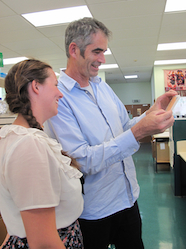Identifying cancer risk

Bryony Telford and Professor Parry Guilford assessing single cell per well techniques.
Discoveries in genetics and immunology have transformed our understanding of cancer. This has advanced our ability to identify individuals and families who have an elevated risk of cancer. It enables us to offer early interventions to either prevent cancers or to treat tumours before they become advanced.
Finding tumours' vulnerabilities
As a tumour grows, it goes through a number of stages. By understanding a tumour's behaviour, and requirements at each stage of its growth, we can develop drugs to target the cancer cell's vulnerabilities.
Related topics
- Biomarkers in ovarian and breast cancers
- Breast cancer: Novel genes involved in susceptibility and response
- Colorectal cancer and vitamin D
- Colorectal cancer in New Zealand: The convergence of epigenetics and the environment
- Inherited gastric cancer susceptibility
- Targeting CDH1 deficient cells using synthetic lethal drugs
Related research stories
- Genetic mutation behind inherited stomach cancer Parry Guilford is interviewed by Robyn Williams on RN The Science Show, ABC Australia website, 5 mins
- Life saver 2017 Distinguished Research Medal winner Professor Parry Guildford can count among his many achievements the discovery of the first-known gene for inherited gastric cancer and the development of a simple-to-use non-invasive test for bladder cancer.
- Genetic Jeopardy Knowledge of her whakapapa saved Dr Karyn Paringatai's life. Now this experience is inspiring her research.
Research personnel
- Professor Mik Black
- Dr Kaneung (Kenny) Chitcholtan
- Tanis Godwin
- Professor Parry Guilford
- Professor Roslyn Kemp
- Professor John McCall
- Professor Ian Morison
- Professor Bridget Robinson
- Professor Logan Walker
- Dr Rob Weeks
- George Wiggins
Our past postgraduate students
- Henry Beetham (PhD research project)
- Chris Hakkaart (PhD research project)
- Tom Kelly (PhD research project)
- Tyler McInnes (PhD research project)
- Bryony Telford (PhD research project)
- Tom Brew (master's research project)
- James Frick (master's research project)